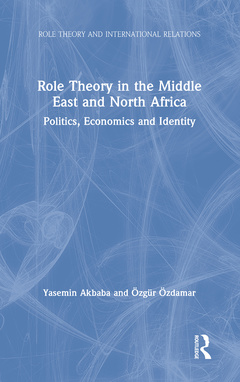Description
Role Theory in the Middle East and North Africa
Politics, Economics and Identity
Role Theory and International Relations Series
Authors: Akbaba Yasemin, Özdamar Özgür
Language: English
Subject for Role Theory in the Middle East and North Africa:
Keywords
ISIS Activity; Role Theory; Turkish Foreign Policy Elite; Foreign Policy; National Role Conceptions; Foreign Policy Analysis; Muslim World; International Relations; Saudi Arabia’s Foreign Policy; International Security; EU Bid; International Relations Theory; Syrian Civil War; International Politics; Arab Uprisings; Middle East Politics; Domestic Role Contestation; Middle East and North Africa (MENA); Role Contestation; ational Identity and Religion; MENA Region; Ethnicity; Politics and Religion; Role Theory Scholarship; Material Sources of Foreign Policy; Foreign Policy Analysis Literature; Ideational Sources of Foreign Policy; post-Arab Uprisings; Constructivism; Traditional Turkish Foreign Policy; Foreign Policy Executive; Egypt; Foreign Policy Roles; Iran; Iran’s Foreign Policy; Saudi Arabia; Turkish Foreign Policy; Turkey; Turkey’s Foreign Policy; Role Conceptions; Islamic Revolution; Marijke Breuning; Saudi Foreign Policy; Cognitive Model of Agent-Structure Relationship; Turkish Policy Makers; Egypt’s Foreign Policy; Arab Nationalism; Muslim Brotherhood; Tahrir Revolution; Shia Revolutionism; Wahhabism; Organization if Islamic Conference (OIC); Islamic Development Bank (IDB); Muslim World League (MWL)
Publication date: 05-2019
· 15.2x22.9 cm · Hardback
Approximative price 68.20 €
In Print (Delivery period: 14 days).
Add to cartPublication date: 05-2019
· 15.2x22.9 cm · Paperback
Description
/li>Contents
/li>Readership
/li>Biography
/li>
Since December 2010, a series of uprisings, revolutions, coups and civil wars have shaken up the Middle East and North Africa region. In this chaotic political environment, several countries have been trying to influence this regional transformation. The implications of this transformation are of great importance for the region, its people and global politics.
Using a rich combination of primary and secondary sources, elite interviews and content analysis, Yasemin Akbaba and Özgür Özdamar apply role theory to analyze ideational (e.g. identity, religion) and material (e.g. security, economy) sources of national role conceptions in Egypt, Iran, Saudi Arabia and Turkey. The authors take a closer look at the transformation of these four powers? foreign policies since the beginning of Arab uprisings, with a specific focus on religion. Each case study is written to a common template allowing for clear comparative analyses.
Written in a clear and accessible style, Role Theory in the Middle East and North Africa offers a thought provoking and pioneering insight into the usefulness of role theory in foreign policy making in the developing world. The perfect combination of theoretically oriented and empirically rich analysis make this volume an ideal resource for scholars and researchers of International Relations, Foreign Policy, Middle East Politics and International Security.
Foreword 1. Introduction: Ambitious Roles in a Transforming MENA 2. Role Theory and Sources of National Role Conceptions: Material and Ideational Factors 3. Egypt and Secular Nationalism after a Century 4. Iran and Shia Revolutionism 5. Saudi Arabia and Religious Conservatism 6. Turkey’s Liberal Offer 5. Conclusion
Yasemin Akbaba is an associate professor at Gettysburg College. Her research focuses on the role of religion in international relations and foreign policy analysis. She has authored/co-authored several journal articles that have appeared in Political Studies, JPR, Comparative European Politics, FPA, Politics and Religion, Nationalism and Ethnic Politics, Ethnopolitics, Civil Wars, International Interactions, Interdisciplinary Journal of Research on Religion, Politics, Religion & Ideology and others. She had also received Gettysburg College’s Thompson Award for distinguished teaching.
Özgür Özdamar is an Associate Professor at Bilkent University, Ankara. He has taught at different institutions, such as the University of Missouri-Columbia, Ministry of Foreign Affairs of Turkey, the Turkish Military Academy and the National Security College. Özdamar's research focuses on foreign policy analysis, IR theories and security studies. His articles were published in journals such as Political Research Quarterly, Foreign Policy Analysis, International Studies Review, Terrorism and Political Violence, Social Science Quarterly and Middle East Policy. He currently serves as editor of All Azimuth: Journal of Foreign Policy and Peace and on the editorial board of Foreign Policy Analysis journal.




